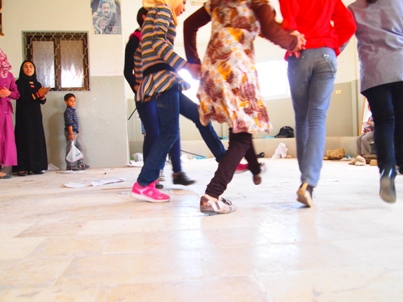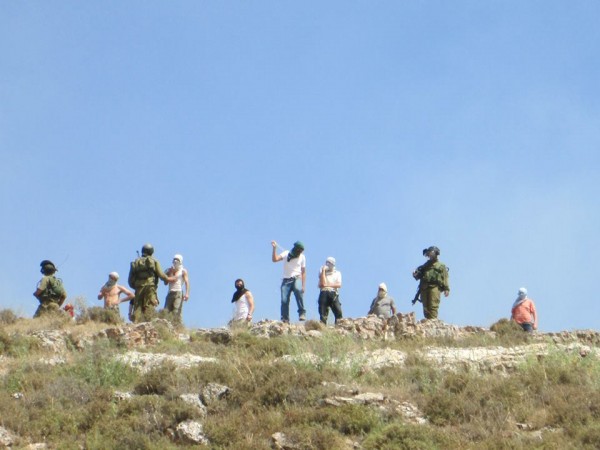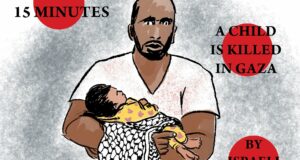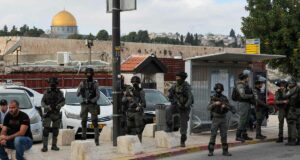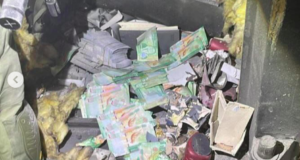19th August 2013 | International Solidarity Movement, Nablus Team | Asira al Qibliya, Occupied Palestine
In the evenings of the 15th and 16th of August, the village of Asira al Qibliya was raided by Israeli occupation forces, who fired teargas canisters and sound bombs throughout the village. Residents of Asira are concerned for the children of the village and how life under the occupation is stealing their childhoods.
The Israeli military recently posted a blog that used falsified images to claim that there was not a humanitarian crisis in Gaza and that Palestinians were enjoying the holiday season of Eid, which comes after the fasting month of Ramadan. It is true that Palestinians all over Palestine are enjoying the holiday season particularly the children, as they have a break from school but they still face the difficulties of living under the occupation on a daily basis.
In Asira, children have been involved in various activities and workshops. On Saturday the 18th of August they celebrated the end of their music workshop with a party. The holiday had not been problem free however, as on the nights of the 15th and 16th of August, at around 9.30pm, the Israeli army drove into the village and shot teargas and soundbombs. Because it was the holidays, children had been playing in the street and families had been relaxing as they were not at work. The army invasion led to everyone being trapped in their homes, suffocating from the gas.
The army shooting their weapons in the night was ‘like lightning,’ an organiser of children’s activities said, ‘leaving people shocked and scared.’ The children’s organiser was confused about the reason behind the attack, asking ‘why do they come now? There have been no incidents or clashes, it’s the Ramadan holiday when people are relaxed, I don’t know why they come.’ The army stayed for 30-40 minutes and made no arrests, leaving the village in shock. Many people wondered why the army would come, other than to add to a list of problems and harassment that the villagers already face.
The villagers of Asira have faced problems with settlers almost daily, even during Ramadan. Settlers from the illegal settlement of Yitzhar regularly attack the village, an attack which the army then join against the villagers when they come out to defend their homes. Settlers have been focusing their attacks on a water project on the outskirts of the village, which is being constructed in order to provide the people of the village with water. Asira has a shortage of water – unlike the nearby illegal settlement of Yitzhar – so families are required to buy tanks of water. However, these are so prohibitively expensive that villagers always have less than they need. The children’s organiser spoke about an attack that day where settlers had managed to set a small fire at the water project, but it was thankfully swiftly extinguished. The water project is scheduled to be finished in 18 months, but with almost daily attacks by the settlers, who knows its fate.
The children of Asira are naturally conditioned by the occupation. The activities organised for them aim to offer an escape and psychological support for the fear and hardships that the occupation creates. During the holidays, children were encouraged to make a film about themselves but instead wanted to make a film about the army and the settlers. This saddened the organiser who said: ‘They should take opportunity to talk about themselves and their feelings. If they want to talk about settlers it will take too long, as the history is long. Children should escape and should not always have to think about the occupation, they should talk about what they want to talk about, they must start now to talk about what they want.’
The party celebrating the end of the music project was a break from the children’s typical games of playing soldier, settler and shabab (Palestinian youth). The children listened to music and joined in with the excercises they had learnt in the workshop, before celebrating Palestinian culture through dabka and traditional songs. The party was interrupted briefly when a boy commented on gathering military on the hill and so everyone believed it would lead to a settler attack. Fortunately that evening they did not attack the village, allowing the children to enjoy their workshop.
 International Solidarity Movement Nonviolence. Justice. Freedom.
International Solidarity Movement Nonviolence. Justice. Freedom.
